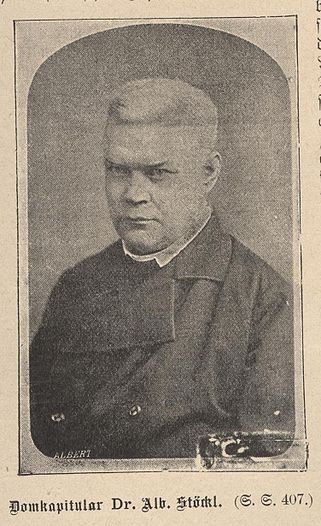
Albert Stöckl
Encyclopedia

He received his classical education at the gymnasium at Eichstädt, studied philosophy and theology at the episcopal lyceum in the same city (1843–48), and was ordained priest 22 April 1848. His first position was that of curate at the pilgrimage church at Wemding
Wemding
Wemding is a municipality in the Donau-Ries district of Bavaria, Germany. Botanist Leonhart Fuchs was born here in 1501.Wemding is home to the Time pyramid, a public art work begun in 1993 and scheduled to be completed in the year 3183....
.
In 1850, he was made instructor of philosophy at the episcopal lyceum at Eichstädt, and two years later was appointed professor of theoretical philosophy in the same institution. He received the degree of Doctor of Philosophy
Doctor of Philosophy
Doctor of Philosophy, abbreviated as Ph.D., PhD, D.Phil., or DPhil , in English-speaking countries, is a postgraduate academic degree awarded by universities...
(1855) from the University of Würzburg
University of Würzburg
The University of Würzburg is a university in Würzburg, Germany, founded in 1402. The university is a member of the distinguished Coimbra Group.-Name:...
; and was transferred (1857) to the theological section of the lyceum as professor of exegesis and Hebrew.
In the autumn of 1862 he accepted a call as professor of philosophy at the academy of Münster in Westphalia
Westphalia
Westphalia is a region in Germany, centred on the cities of Arnsberg, Bielefeld, Dortmund, Minden and Münster.Westphalia is roughly the region between the rivers Rhine and Weser, located north and south of the Ruhr River. No exact definition of borders can be given, because the name "Westphalia"...
. The disagreeable divisions and discord which arose in this institution at the time of the Vatican Council
Vatican Council
The First Vatican Council took place in 1869 - 1870 and was the 20th of ecumenical councils recognized by Roman Catholicism.The Second Vatican Council took place in the 1962 - 1965 and was the 21st....
led Stöckl, in the summer of 1871, to resign his professorship and return to the Diocese of Eichstädt as parish priest at Gimpertshausen.
On 7 March 1872, he was installed as a cathedral canon at Eichstädt. At the same time he again became professor of practical philosophy, philosophy of religion, and pedagogy in the lyceum. In addition to his labours as a scholar Stöckl also took an active part in political life. From 1878 to 1881 he was a member of the lower house of the Reichstag
Reichstag (German Empire)
The Reichstag was the parliament of the North German Confederation , and of the German Reich ....
.
Works
During the many years of his life spent in teaching, Stöckl wrote a large number of text-books covering the entire field of philosophy which had a large circulation not only in Germany but also in other countries, including the United States of America. As one of its most distinguished representatives, he had an important share in the revival of Thomistic philosophy. Both as teacher and as author he was noted for simplicity, logical acumen, and lucidity.Among his numerous writings the following should be mentioned particularly:
- "Liturgie und dogmatische Bedeutung der alttestamentlichen Opfer" (Ratisbon, 1848)
- "Die speculative Lehre vom Menschen und ihre Geschichte" (Würzburg, 2 vols., 1858–59)
- "Die Lehre der vornicänischen Kirchenväter von der göttlichen Trinität" (Eichstädt, 1861, in the "Programm" of the lyceum)
- "Das Opfer nach seinem Wesen und nach seiner Geschichte" (Mainz, 1861)
- "Geschichte der Philosophie des Mittelalters" (3 vols., Mainz, 1864–66)
- "Lehrbuch der Philosophie" (Mainz, 1868; 7th ed., 3 vols., 1892; 8th ed., revised by G. Wohlmuth, 1905-)
- "Lehrbuch der Geschichte der Philosophie" (Mainz, 1870; 3rd ed., 2 vols., 1888; tr. "Handbook of the History of Philosophy", by T. A. Finlay, S.J., Dublin, 1887)
- "Die Infallibilität des Oberhauptes der Kirche und die Zustimmungsadressen an Herrn von Döllinger" (Münster, 1870; 2nd ed., 1870)
- "Grundriss der Aesthetik" (Mainz, 1871; 3rd ed., 1889, under the title, "Lehrbuch der Aesthetik")
- "Grundriss der Religionsphilosophie" (Mainz, 1872; 2nd ed., 1878); "Lehrbuch der Pädagogik" (Mainz, 1873; 2nd ed., 1880)
- "Lehrbuch der Geschichte der Pädagogik" (Mainz, 1876)
- "Der Materialismus geprüft in seinen Lehrsätzen und deren Consequenzen" (Mainz, 1877)
- "Das Christenthum und die grossen Fragen der Gegenwart auf dem Gebiete des geistigen, sittlichen und socialen Lebens. Apologetisch-philosophische und socialpolitische Studien" (3 vols., Mainz, 1879–80)
- "Geschichte der neueren Philosophie von Baco und Cartesius bis zur Gegenwart" (2 vols., Mainz, 1883)
- "Das Christenthum und die modernen Irrthümer. Apologetisch-philosophische Meditationen" (Mainz, 1886)
- "Geschichte der christlichen Philosophie zur Zeit der Kirchenväter" (Mainz, 1891)
- "Grundzüge der Philosophie" (Mainz, 1892; 2nd ed., edited by Ehrenfried, 1910)
- "Grundriss der Geschichte der Philosophie" (Mainz, 1894)
- "Lehrbuch der Apologetik" (2 pts., Mainz, 1895).
Stöckl contributed numerous papers on apologetics
Apologetics
Apologetics is the discipline of defending a position through the systematic use of reason. Early Christian writers Apologetics (from Greek ἀπολογία, "speaking in defense") is the discipline of defending a position (often religious) through the systematic use of reason. Early Christian writers...
, philosophico-historical, and pedagogical subjects to the periodical press, especially to Der Katholik. He also wrote a large number of articles for the second edition of the "Kirchenlexikon", and several of the longer articles for the "Staatslexikon der Görres-Gesellschaft".

